After announcing, on Friday April 22, a surprise embargo on palm oil exports, scheduled to come into force on Thursday April 28, the Indonesian government has partially revised its copy. Only refined palm oil products used in the manufacture of cooking oil are affected by the ban, and not crude palm oil, according to a communication from the Ministry of Agriculture dated Monday, April 25.
This clarification should mitigate some of the deleterious effects of the embargo on the national market, but also on world markets, which have panicked in recent days, in the context of a shortage of sunflower oil due to the war in Ukraine. Thus, the embargo should now affect only 30% to 40% of Indonesian palm oil exports. The adjustment was met with relief in particular in India, its first client. It could, however, contribute to higher prices in the food industry on all continents.
Indonesia is the first producer of palm oil on the planet, and the first exporting State, with 60% of the world market, selling abroad up to two thirds of its production, i.e. approximately 30 million tons per year. year. However, the persistent rise in prices since the end of December 2021 has had an inflationary effect in the country. In January, the government then imposed a quota on producers requiring them to reserve 20% of their palm oil production, all products combined, for the internal market at fixed prices, then 30% in March. Before removing it, in favor of an increased export tax. At the same time, a cap on the price of cooking oil, also imposed in January, was lifted in favor of direct subsidies.
These back and forths have led to price swings, consumer rushes for cooking oil, and speculative behavior in the industry, adding to the resentment against food price hikes, and fueling popular vindictiveness against a “cooking oil mafia” ready to do anything to get rich on the backs of consumers. On Wednesday, April 20, an investigation was opened for corruption within the Ministry of Commerce following the allocation of export permits to three palm oil producers who allegedly did not respect the quotas for the national market.
Beginning of bronca
According to a poll conducted in mid-April by the Indikator Politik Indonesia institute, the Indonesian President, Joko Widodo, saw his popularity erode from 75.3% in January to 59.9%, a level he had already reached the worst of the Covid-19 pandemic, at the time of the wave of the Delta variant, in 2021. On April 22, he announced an embargo on palm oil exports, a radical measure, in principle temporary, supposed Calm things down as the major Lebaran holidays approach, for the celebration of the end of Ramadan, on May 2 and 3. “I will continue to monitor and evaluate the implementation of this policy in order to provide cooking oil in this country in abundance. [et] at an affordable price,” he said. On Tuesday, April 26, Mr. Widodo instructed his economy minister, Airlangga Hartarto, to stabilize the price of cooking oil at 14,000 rupees per liter (i.e. 0.91 euro), 30% below the current price.
You have 30.16% of this article left to read. The following is for subscribers only.
